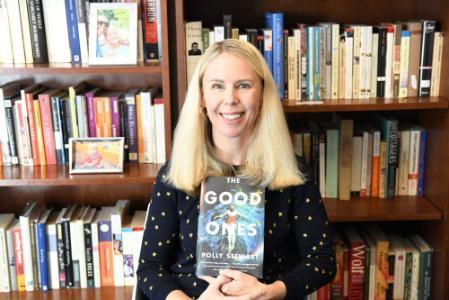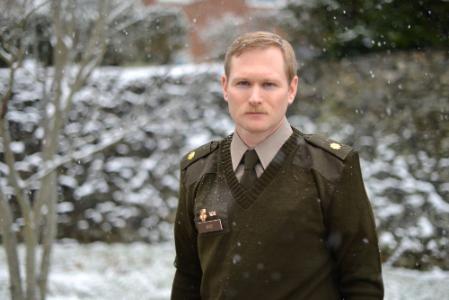Two VMI English Professors Land Books Deals
LEXINGTON, Va. Jan. 17, 2024 — Lt. Col. Mary “Polly” Stewart Atwell, associate professor, and Maj. Henry A. Wise III ’05, assistant professor, both in the Department of English, Rhetoric, and Humanistic Studies at Virginia Military Institute, have secured book deals.
Atwell writes under the pen name of Polly Stewart has successfully sold her third novel to publisher Harper Books at HarperCollins in New York. The new book titled, “The Felons’ Ball” is a rural noir set in the Appalachian Mountains of Virginia. It follows Natalie Macready, the youngest daughter of a powerful family with a sordid history (including distilling and selling moonshine) and a feeling of impunity, whose dark secrets set a chain of events in motion at their annual party dubbed, ‘The Felons’ Ball,’ as she finds herself caught in the vortex of her family’s history and its deadly consequences, exploring questions of crime, gender, and class in the South. 
In literary fiction, the genre of noir is defined when a character is placed in an impossible situation as a result of making mistakes and poor choices, and must pay the consequences, usually without a tidy resolution.
Atwell’s first two novels, “Wild Girls” and “The Good Ones,” also take place in small towns in the Appalachian Mountains of Virginia. Although each book stands alone and the characters are not shared in the three works, she imagines them bumping into each other at Kroger. "My father’s family settled in Virginia in the mid-nineteenth century, and I grew up here. I'm so happy to be living in this part of the country again." she shared.
An exceptionally disciplined writer, Atwell wakes each day at 4 a.m., and writes for three hours. She organizes the outlines of her stories by employing the three-act structure, a model used in narrative fiction that divides a story into three parts, or acts. She uses a large cork board on which she tacks index cards with story actions in order, and rearranges the cards, and order of the action if necessary. “I teach the three-act structure in class when discussing revisions. It makes writing much easier because in writing, events must happen in a certain order, and often the writer must revise the order. Rearranging the cards helps form the action. It’s like a seesaw, where there are back-and-forth, moving pieces. Revising is a big part of writing. You need to make sure every part of the story is working,” she said.
“The Felons’ Ball” will be available for purchase next year. “Wild Girls” and “The Good Ones” are currently available in bookstores and on Amazon.com. Atwell has sold the film and television rights for “The Good Ones.”
Wise has sold his novel, “Holy City” in a two-book deal. “Holy City” is scheduled to be published June 4 by Grove Atlantic. The second book will be published next year.
 “Holy City” tells the story of Will Seems, who after a decade of exile precipitated by the tragic death of his mother, returns home from Richmond to rural Southern Virginia, and takes a job as a deputy sheriff.
“Holy City” tells the story of Will Seems, who after a decade of exile precipitated by the tragic death of his mother, returns home from Richmond to rural Southern Virginia, and takes a job as a deputy sheriff.
Seems’ efforts to go about his life are disrupted when a mysterious, brutal homicide claims the life of an old friend, forcing Seems to face the true impetus for his return: not to honor his mother's memory, but to pay a debt to a Black friend who, in an act of selfless courage years ago, protected Seems and suffered permanent disfigurement for it. Meanwhile, a man Seems knows to be innocent is arrested for the murder, and despite Seems’ pleas, his boss appears all too content to wrap up the case and move on. Seems must weigh his personal guilt against his public duty when the local Black community hires Bennico Watts, an unpredictable private detective from Richmond, to help him find the real killer. It doesn't take long for Watts and Seems to realize they much prefer to operate alone.
Wise, who teaches full time and is the father of two young children, cherishes the limited time he has to write, and uncommonly chooses to write longhand on a legal pad. “I feel more creative writing longhand. I also use a 1920 Royal portable typewriter that I inherited from a great uncle. I type the first draft on the typewriter because it forces me forward, and there's a physical rhythm to it. Does everybody around me like it? No, because it's pretty loud. But I can find a corner of the house or a time when nobody else is around, and it works just fine,” he shared. Once his first draft is complete, Wise transcribes his work onto the computer.
There are no scheduled plans for a book launch yet, but according to Wise, it may take place in Richmond. The city plays a major part in the book, not the least of which is the title, as Richmond is known as the “Holy City.” “There are some really good bookstores in Richmond, I've got a lot of great connections in Richmond, and I mostly grew up there,” stated Wise.
Wise earned his Bachelor of Arts degree in English from VMI, where he started his writing, using it as a coping tactic in the midst of the intense physical and academic rigors that challenged him as a cadet. “My writing was something I could control in a place where I controlled very little. I found innovative ways to write when I shouldn't have been writing,” he laughed. He is part of a VMI family legacy which includes his uncles, Anderson Wise ’60 and Richard S. Wise ’68, as well as his grandfather, Henry A. Wise, Class of 1927. His great-great-great grandfather was Henry A. Wise, governor of Virginia (1856-1860), whose son John S. Wise, Class of 1866, was one of the cadets wounded in the Battle of New Market in 1864. Wise believes that when he matriculated in 2001, he was 32nd of the Wise family to do so. His cousin, Ethan Wise ’24 is a current cadet scheduled to graduate in May, making him the 33rd Wise.
After graduating from VMI, Wise taught for several years in Taiwan, where he worked for the Republic of China Military Academy in Fengshan, selecting, instructing, and training cadets who would go on to study in American military institutions, including VMI. In 2015, he earned his Master of Fine Arts degree in poetry from the University of Mississippi, where he taught creative writing and composition. In 2017, he joined VMI’s English faculty where he teaches American literature and creative writing and serves as faculty adviser to Cadence, VMI’s annual fine arts journal, which he edited as a cadet. He has taught a variety of courses including Frontier American Literature and the works of William Faulkner. A writer across multiple genres, his poetry has been published in Shenandoah, Radar Poetry, Clackamas, and Eunoia Review.
Marianne Hause
Communications & Marketing
VIRGINIA MILITARY INSTITUTE
.svg)
.png)